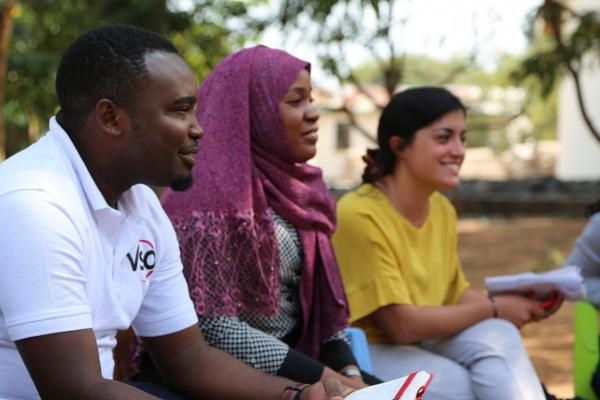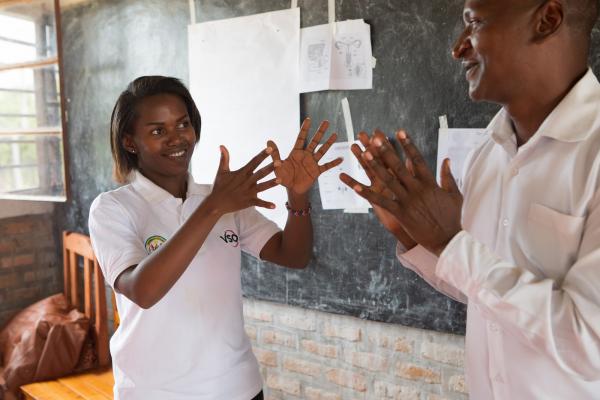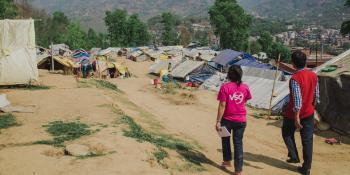
Volunteering is too often badly misunderstood. Too often, it is seen as a “worthy” activity undertaken by people with time on their hands. However, it really is a fundamental part of any country’s development journey and when done properly, it can be a tool for creating a fairer world for everyone.

By creating opportunities for people to become active citizens, volunteering helps, not just to identify and deliver solutions to the challenges facing communities and societies but can redefine the challenges themselves.
This is why the recently published United Nations “State of the World’s Volunteerism” report is so welcome. Two of its main findings are that volunteers build bridges between people and governments and have the ability to highlight and address inequalities of opportunity, resources, and power that exist in society.
The report validates research that VSO published in our “Valuing Volunteering” report from 2015. This demonstrated the fundamental role that volunteers play in developing and brokering relationships between people, communities, and governments to create lasting change. This latest report from the United Nations deepens the evidence base for that research and confirms its findings.
A changing volunteer landscape
Since 2015, VSO programming and research has focused on building active citizenship through developing inclusive volunteering practice. Our research and practice tells us that it is not just the act of volunteering, but the mix of volunteers – what we perhaps clumsily call our “blended volunteering approach” – that helps to challenge these power relations between states and citizens while ensuring that our work has a lasting impact.
It is not always so obvious what the different category of volunteer (international, national, community) bring. Both national and international volunteers, for example, bring different specialist skills. Both national and community volunteers have insights on context. In practice, volunteer skills are not fixed and do not map neatly into particular boxes whatever our preconceptions.

Managed with awareness and reflection, it is clear that the contribution of different volunteers changes overtime in response to needs and a re-negotiation of power and knowledge amongst volunteers themselves. This is particularly important in building ownership and sustainability of outcomes and is a significant move away from the idea that volunteers from the Global North have all the answers to complex problems.
Overcoming barriers to active citizenship
COVID-19 has pushed millions more people into extreme poverty and increased societal inequalities, reversing decades of progress. The UN has long recognised that the Sustainable Development Goals will not be delivered without the mobilisation of hundreds of millions of volunteers.
The United National Volunteers (UNV) research highlights the many barriers that people face including the ways in which people can be excluded from volunteering. VSO’s award-winning volunteers like Brown Niyonsaba, a Deaf health volunteer in Rwanda, or Anju and Prakiti, the deaf Nepali volunteers who translated public health materials into sign language to support the deaf community access public health messages, demonstrates the incredible impact that volunteers from different backgrounds and abilities can have.

UK Aid Volunteering for Development
Driving volunteer impact to deliver improved health, education and livelihoods outcomes for two million people.
This is why we at VSO are working so hard to promote and support the adoption of the Global Standard for Volunteering for Development. This will help support organisations around the world, as well as allow us to continue to look at our own practices of recruiting, supporting, and training community, national and international volunteers
The growing network of volunteers
Volunteering is often informal - neighbours helping each other during disasters or even small and everyday acts of kindness and solidarity. Recognising and supporting informal networks, as well as the potential that the rise of “remote” volunteering offers, will help us to further harness the amazing potential of volunteers to meet the ambition of the Sustainable Development Goals. On top of this, we can ensure that those who have been made most vulnerable or marginalised are heard and supported in their actions.
At a time when we appear to be going backwards, the world needs to recognise, support, and empower a growing global network of volunteers to maximise their ability to contribute to our shared development goals. VSO has been proud to work with governments in places like Kenya, Nigeria, Nepal, and Bangladesh, as well as multilateral agencies such as the Africa Union, to support the development of practice, policies and laws that will promote inclusive and responsible volunteering.
We look forward to continuing to work with all our partners to ensure that this extraordinary power of volunteers to “build bridges” and create a fairer world, is properly harnessed.
How VSO works
We bring about lasting change not by sending aid, but by working through volunteers and partners to empower communities in some of the world’s poorest regions. Find out more about what we do and why it works.
Read more

Transforming lives through education: Geoffrey’s VSO legacy
With a deep belief in the transformative power of education, Geoffrey from Norfolk, UK, has devoted his life both in the UK and abroad to making education more accessible for all.
